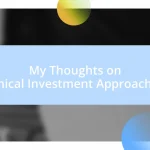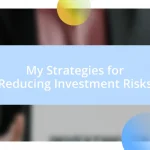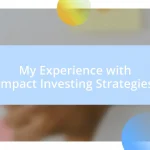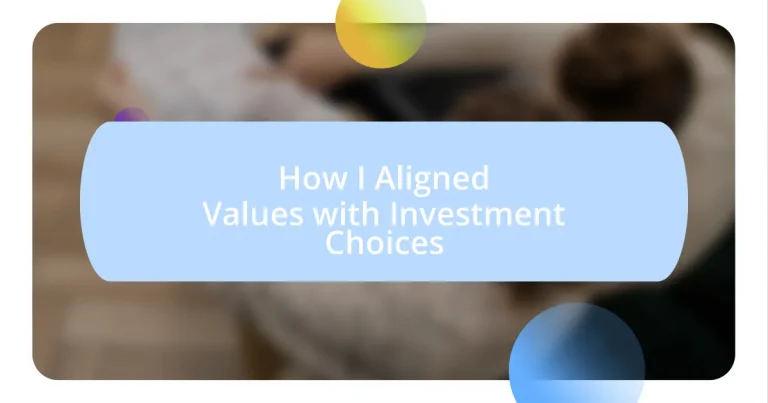Key takeaways:
- Personal values shape investment decisions, evolving over time as one’s life circumstances change.
- Reflecting on investment goals helps clarify financial ambitions and emotional milestones.
- Researching value-driven investments involves identifying personal values and utilizing ESG ratings for informed choices.
- Regularly monitoring investments ensures alignment with personal values, allowing for adjustments as necessary.
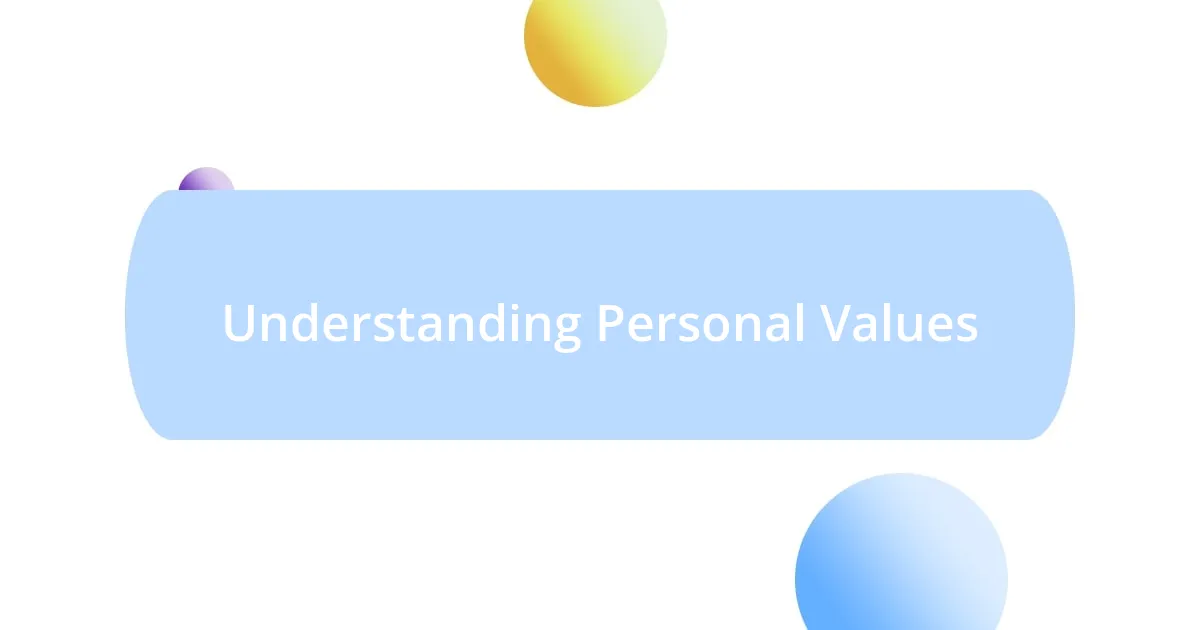
Understanding Personal Values
Understanding personal values is essential, as they form the foundation of our decisions, including investments. I still remember the moment I realized my deep-seated belief in sustainability was a core aspect of who I am; it pushed me to reconsider where I put my money. Isn’t it fascinating how our values can shape not just our choices, but also our identity?
When I think about my values, I draw back to my upbringing. Growing up in a community that valued social justice made me acutely aware of the impact of inequality. Have you ever paused to reflect on how your background has influenced your values? It’s something I encourage you to explore, as understanding this connection can profoundly affect your investment strategies.
Moreover, personal values can evolve over time, just as our lives change. Looking back five years, I can see how my priorities shifted from pure profit-oriented investments to those aligning with ethical considerations. How have your values shifted? Recognizing these changes can help you refine your investment choices, ensuring they resonate with who you truly are at this moment.
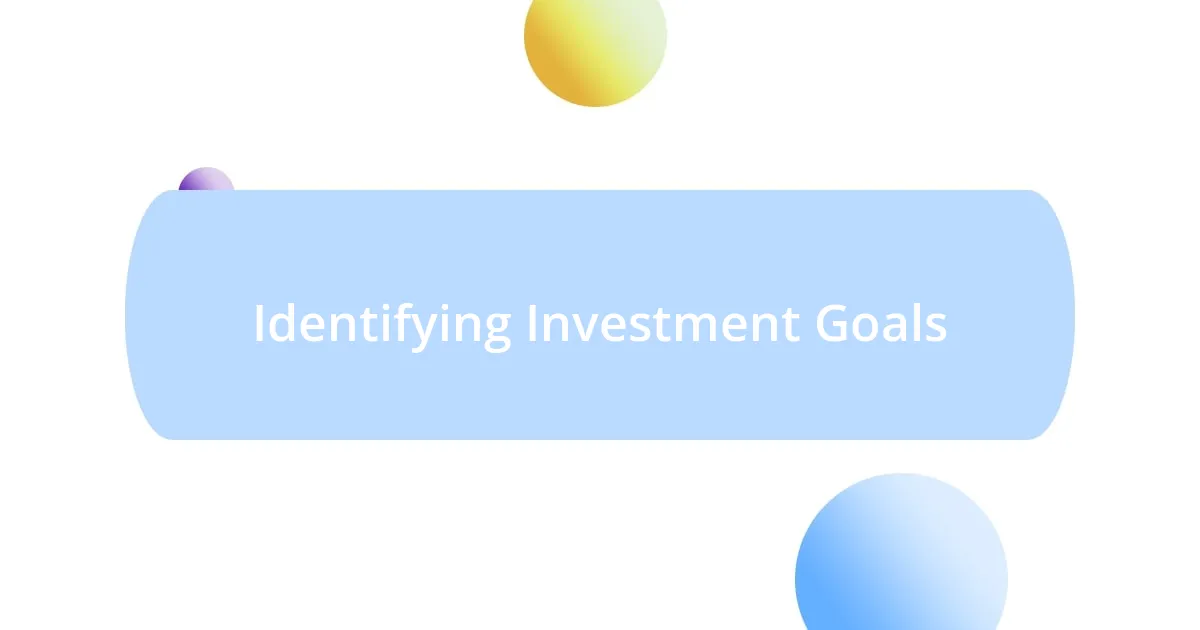
Identifying Investment Goals
Identifying investment goals starts with introspection. I recall a time when I hastily followed market trends without pausing to consider what I truly wanted to achieve. It took some moments of reflection to understand that my financial journey wasn’t just about accumulating wealth; it was also about creating a positive impact. Have you ever thought about what investing means to you beyond profits?
As I delved deeper into my goals, I realized they needed clarity. Was I saving for retirement or hoping to fund my child’s education? Or perhaps one day, I’d want to support a cause I’m passionate about. Writing these down helped me visualize not just my financial targets, but also the emotional milestones attached to them. How do you envision your financial future?
To refine this further, I found it helpful to categorize my goals. Short-term goals, like funding a vacation or renovating my home, needed different strategies compared to my long-term aspirations, like building a legacy or achieving financial independence. This categorization has been pivotal in my investment decision-making, aligning my choices with what’s truly important to me.
| Investment Goal Type | Description |
|---|---|
| Short-term | Goals within the next 1-3 years, such as saving for a vacation. |
| Medium-term | Goals between 3-10 years, like buying a home or funding education. |
| Long-term | Goals beyond 10 years, focused on retirement and legacy building. |
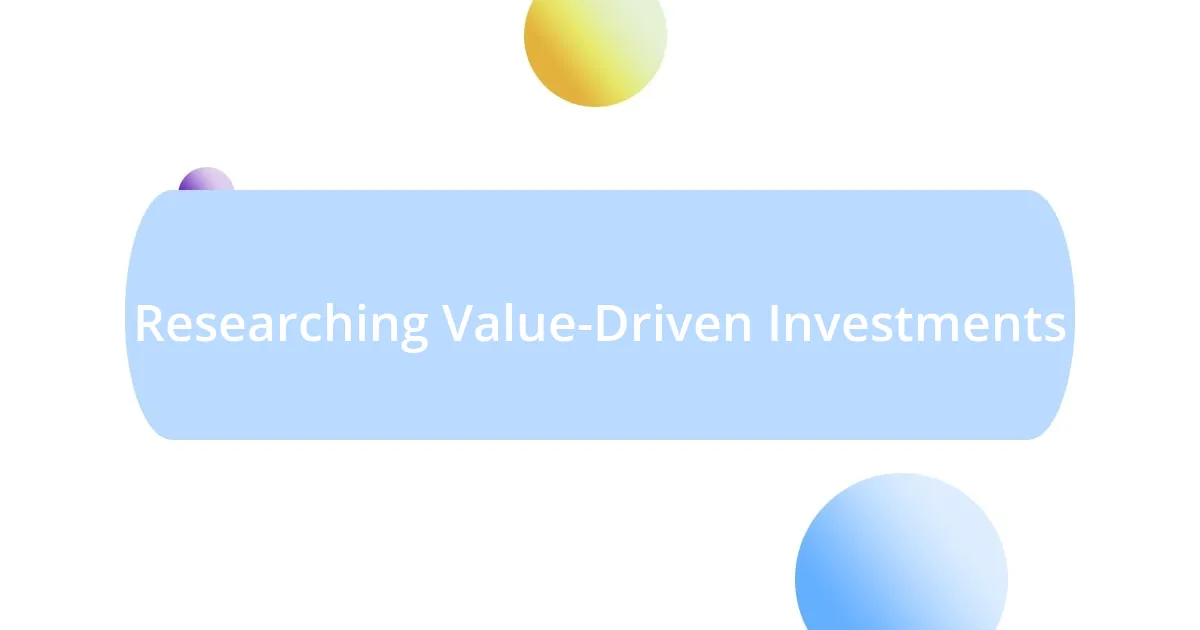
Researching Value-Driven Investments
Researching value-driven investments is a crucial step for aligning money with personal beliefs. I remember diving into various investment platforms, initially feeling overwhelmed by the abundance of choices. However, I found that focusing on companies that champion sustainability and social responsibility helped narrow my options significantly. It’s like shopping for groceries when you’re trying to buy only organic products—you quickly develop a shortlist based on your values.
To assist in your research journey, consider these key steps:
- Identify Values: Make a list of the values that matter most to you, such as environmental sustainability, diversity, or community impact.
- Use Research Tools: Explore platforms that provide ESG (Environmental, Social, and Governance) ratings or ethical investment filters.
- Read Impact Reports: Look for companies that publish annual reports detailing their social and environmental impact.
- Connect with Community: Engage with online forums or local groups where like-minded investors share insights.
- Consult Financial Advisors: Seek out advisors who specialize in socially responsible investing (SRI) to guide your choices.
I found that the depth of my research truly opened my eyes to the myriad of opportunities aligned with my values, creating a fulfilling investment journey. It was a revelation to see how investing can become a powerful tool not just for personal gain, but for contributing to a cause I genuinely believe in.
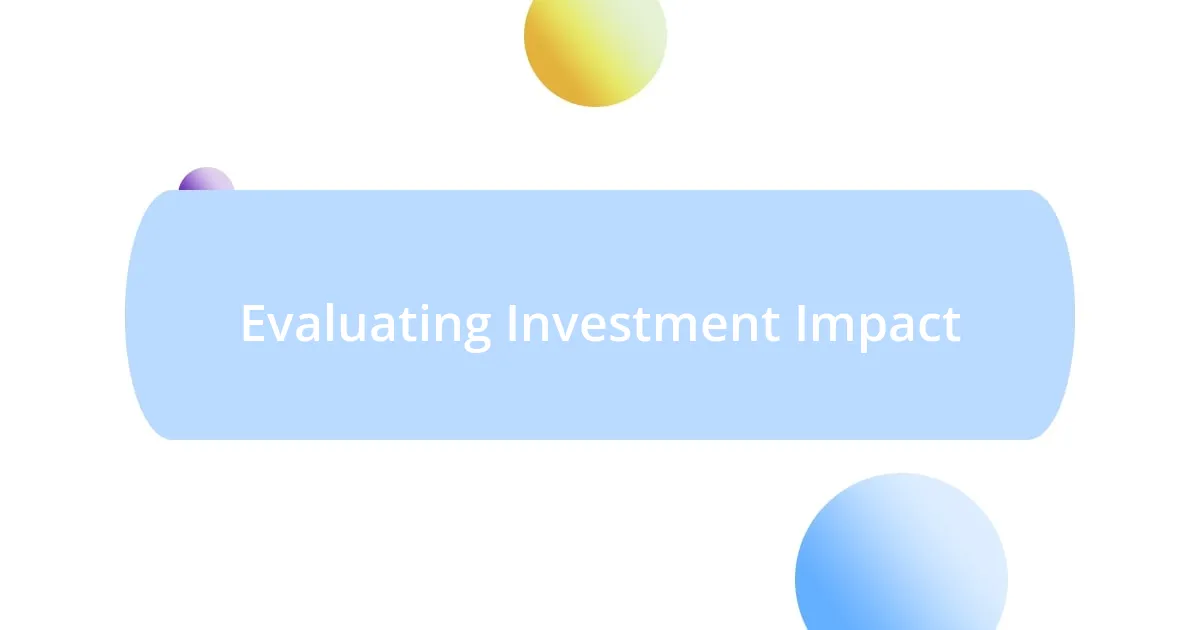
Evaluating Investment Impact
Evaluating the impact of investments isn’t just about numbers; it’s about understanding the ripple effects they create. I remember scrutinizing my portfolio one evening, reflecting on whether my choices were genuinely aligned with my values. Have you ever paused to think about where your money is going and the stories behind those investments?
As I analyzed my holdings, I began to evaluate not just financial returns but also social and environmental consequences. For instance, divesting from companies with poor labor practices felt like a necessary step. It was enlightening to realize that my investments could either support or undermine the causes I care about. Isn’t it empowering to choose investments that resonate with your principles rather than blindly chasing profits?
By merging financial performance with ethical considerations, I’ve found a deeper sense of purpose in my investment journey. I often assess how each investment fosters positive change—whether it’s supporting renewable energy or advocating for diversity in the workplace. This holistic evaluation method has transformed my approach, reinforcing the belief that I can make impactful choices while securing my financial future. How do you evaluate the impact of your investments?
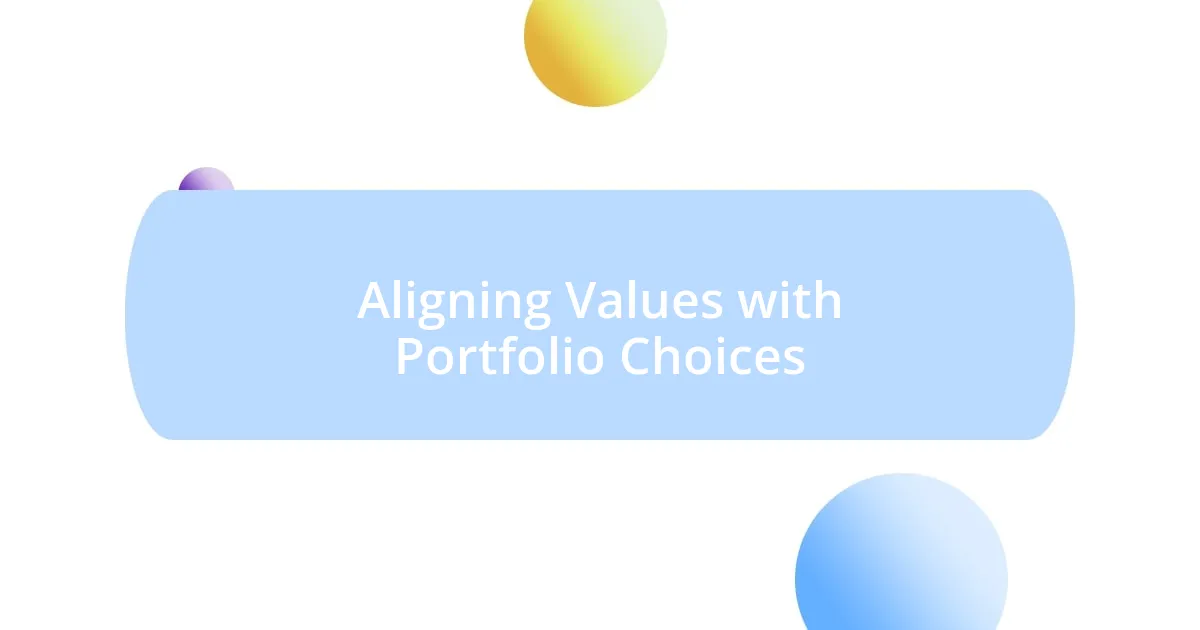
Aligning Values with Portfolio Choices
Aligning values with portfolio choices is not merely a financial exercise; it’s like crafting a personal mission statement. I recall the moment when I decided to invest in a renewable energy company instead of a traditional energy provider. The decision was incredibly fulfilling, as it aligned not just with my financial goals but also with my passion for environmental stewardship. Don’t you think it’s rewarding when your investments echo your beliefs?
I often reflect on how my portfolio can serve as an extension of my values. For example, when I made the switch to a community-focused investment fund, I felt a surge of pride knowing that my contributions were helping local businesses thrive. The emotional satisfaction that comes from aligning investments with ethical principles is profound. Isn’t it amazing how financial choices can contribute to the greater good?
Moreover, integrating personal values into investment choices has opened my eyes to new opportunities. I once attended a seminar focused on ethical investing, and it sparked my interest in socially responsible tech companies. They not only have the potential for growth but are also committed to making a positive impact. This experience taught me that aligning my portfolio with my values not only enriches my financial journey but also amplifies my sense of purpose, creating a partnership between my beliefs and financial strategy. How can you integrate your values into your investment decisions?
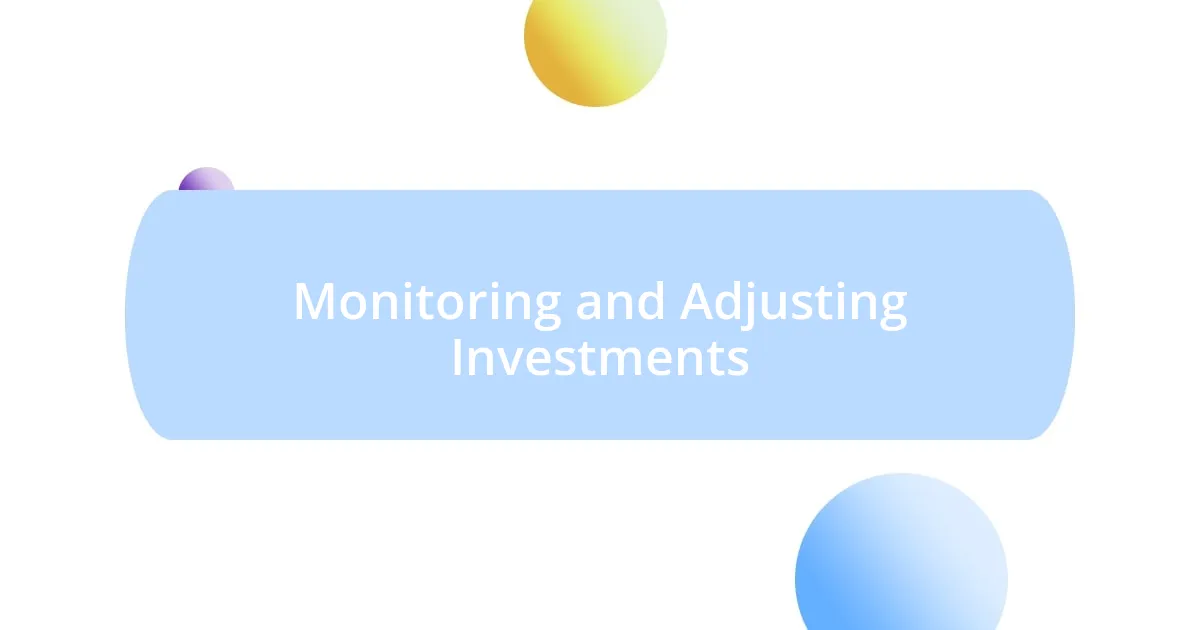
Monitoring and Adjusting Investments
Monitoring my investments has become a vital practice in ensuring they truly reflect my values. I often set aside time each quarter to review my portfolio, looking not just at the numbers but also at how each investment aligns with my ethical commitments. Have you taken the time to connect your financial performance with your personal values?
As I delve into the details, I keep an eye out for shifts in company practices or emerging trends that might impact my investments. For instance, when I learned that a company I had invested in was not upholding its environmental commitments, I didn’t hesitate to recalibrate. It’s crucial to remain proactive, as the landscape of ethical investing can change quickly; staying informed helps me decide whether to adjust my holdings accordingly.
I also take advantage of tools and resources to track the social impact of my investments. Recently, I used an ESG (Environmental, Social, Governance) rating platform that highlighted companies genuinely committed to sustainability. Seeing my portfolio evolve based on these metrics not only reassures me but also fuels my enthusiasm for informed investing. Isn’t it invigorating to actively shape a portfolio that speaks to both financial growth and the values we hold dear?

Sharing Your Investment Journey
I love sharing my investment journey, as it often sparks rich conversations with friends and family. Recently, at a dinner party, I excitedly recounted how moving my retirement fund to a sustainable investment made me feel more connected to my values. Have you ever felt that thrill of aligning your finances with something you believe in? It’s like lighting a spark that ignites further discussions about purpose-driven investing.
When I first started sharing my experiences on social media, the response was overwhelming. It was heartwarming to see others resonate with my choices. One follower reached out to share her own journey into ethical investing after seeing my posts, which deepened our connection. Isn’t it fascinating how sharing vulnerability can inspire others to reflect on their financial paths?
Being transparent about my investment choices has not only been liberating, but it has also helped me grow. Every time I recount my story of divesting from companies that didn’t align with my values, I find it reinforces my commitment. I can’t help but wonder, how many others might find clarity in their own financial decisions through shared experiences? Our investment journeys are intertwined narratives waiting to be explored together.




